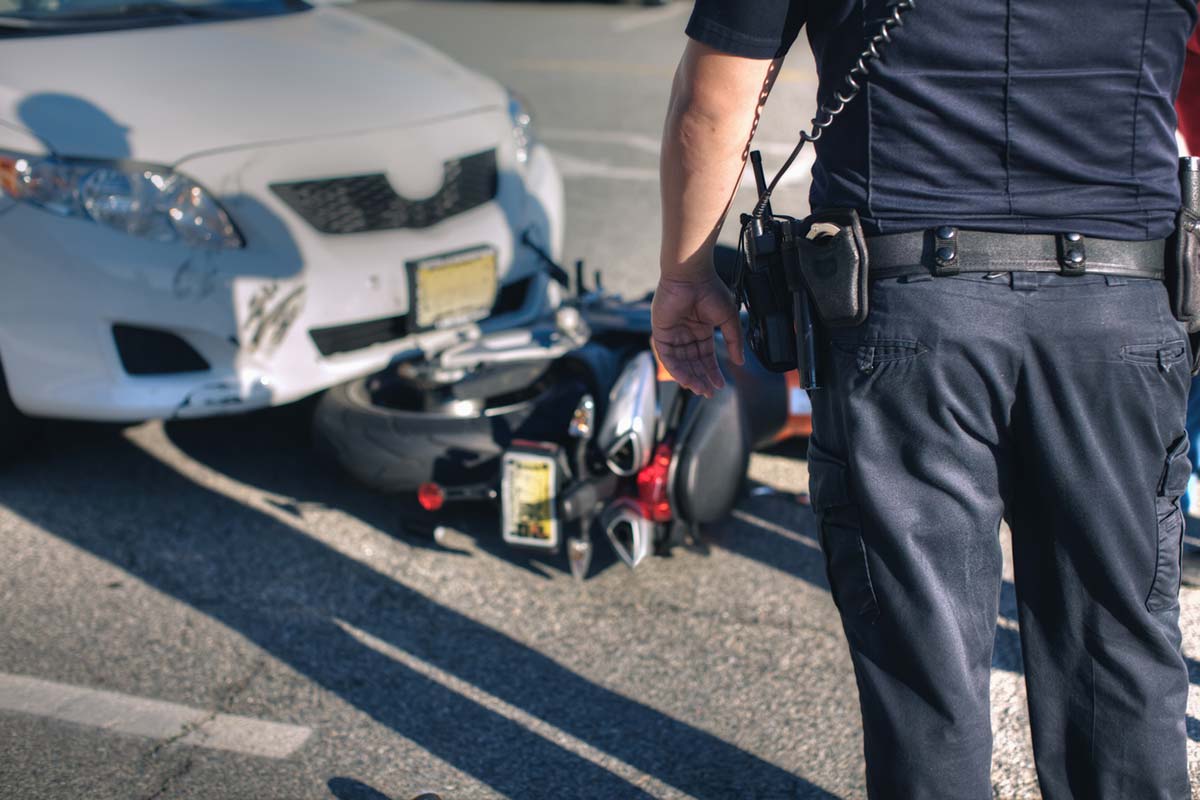Immediately after a motorcycle accident, when you brush yourself off and stand to your feet, you may find yourself in an altered emotional state. Do your best to approach the experience logically, and avoid saying anything – or acting in any way – that may be interpreted as admitting guilt. For your best chance at claiming damages and proving your innocence, adhere to the following six guidelines:
1. Check Yourself and Others for Injury
The first thing you should do after an accident is check yourself and the others involved for injuries. Immediately call 911 whether you, passengers, other drivers, or anyone is hurt. You will not be held responsible for the accident simply because you placed the call for help.
2. Take Photos First
Ensure the scene is safe enough to take pictures, so you do not cause further damage, or risk the safety of yourself or others. If you have technology on hand, such as a cell phone or a camera, take pictures from a variety of angles. Documenting the motorcycle, other involved vehicles, and the surrounding environment may prove helpful with insurance or during a court case.
3. Move Your Bike Off of the Road
Whether or not you can successfully take pictures, move your bike off the road as soon as it is safe. Leaving your vehicle on the road is hazard to oncoming traffic. Approaching drivers do not know there has been an accident. Debris and unexpected vehicles in the road, particularly at night, may result in additional accidents and injury, for which you may be held responsible.
4. Gather Information
If you did not call 911 for emergency assistance, contact your local police department. A police officer will arrive at the scene of the accident to draw up a police report. This will act as an important official document when proving details of your case. Protect your legal rights and potential compensation for your damages by gathering important information. Speak with witnesses, passengers, other drivers, and the police officer. Gather the following, so you have everything you need:
- Contact information, including the names and phone numbers or email addresses, of all witnesses
- Vehicle information of involved vehicles, including: make and model of the vehicles, and license plate numbers
- The name and badge number of the officer
- The police report number
- Contact information for other drivers, including names, phone numbers, addresses, and email addresses
- The vehicle identification numbers (VIN) for any involved vehicles
- Insurance company name and contact information for involved vehicles
5. Call Your Insurance Agent
Call your insurance agent as soon as you can after your motorcycle accident. Be prepared to offer them all of the information you have gathered for a streamlined experience. Remember, do not admit fault to anyone, including your insurance company. If your agent asks about your injury or motorcycle damage, insist that you will wait to offer this information until you have visited a doctor and brought your car to a professional mechanic. Underestimating your damages (pain and injuries often appear days after your accident) can reduce your rightful compensation.
6. Contact a Motorcycle Accident Attorney
You may need a motorcycle accident attorney for a variety of reasons after your accident. If you are innocent, but the other parties claim the accident was your fault, if your insurance company denies your claim, your damages exceed the limits of your policy, or you have incurred severe physical injuries and associated costs, an attorney can help. Contact an experienced motorcycle accident attorney in your area today to obtain your rightful compensation for damages.


